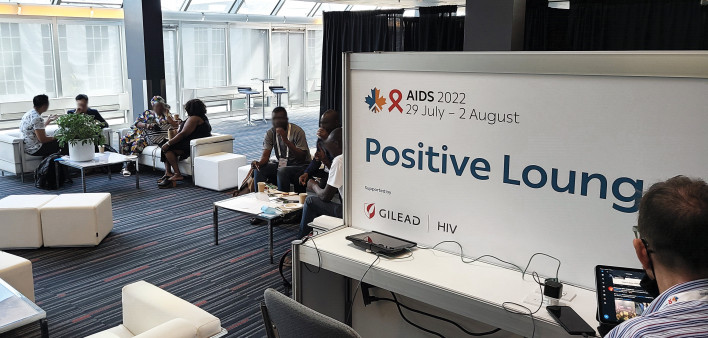The server is dressed in a black bolero jacket, the kind of thing waiters in a fine restaurant might wear, and he is carrying a tray of juices to restock the food table. Clearly, he is conscientious about his work, because the table is a pristine assortment of baked goods, coffee service and other refreshments. The server returns to a catering area behind a black curtain for more supplies.
There is a white leather seating area in the center of the main lounge, beyond which are quiet spaces, mats for occasional yoga sessions and a curtained area with massage tables at the ready. Because the lounge is located on the highest level of the Palais des congrès de Montréal, there is a rooftop deck just outside featuring stunning views of the city. The entire operation is staffed by cheerful volunteers who speak in low, comforting voices.
This is the Positive Lounge at the International AIDS Conference (AIDS 2022), made available for attendees who are living with HIV. Walking into the lounge is an implicit disclosure of one’s HIV status.
The lounge was created by a team that included Jordan Arseneault, a Montreal man living with HIV who is the cofounder of the SéroSyndicat, a collective focused on HIV justice and health. The corporate-luxe feel of the main lounge area isn’t what Arseneault had in mind, but the project has been a learning process for him.
“This is supposed to be a reprieve from the information overload of the conference,” Arseneault explains, even if it isn’t what he initially envisioned. His activist educator hat was hard to remove. He had originally wanted a more dynamic space that educated people with HIV about issues and injustices they care about. He was convinced to do otherwise.
“Imagine you are from the Global South,” Arseneault says about his change of heart, “and you come here to the lounge and I, as a white Canadian, have thoughtfully curated a poster exhibition about sub-Saharan Africa—it could go wrong really easily.”
Everything, from the elegant catering service to the modernist leather furniture (“It’s giving me a Brian Eno Music for Airports vibe,” Arseneault quips), comes courtesy of the conference host, the International AIDS Society (IAS), and Gilead Sciences, which foots the bill.
In the earliest years of the AIDS crisis, organizations in large epicenter cities did everything they could to make life, and looming death, as comfortable as possible. The list included massages and complimentary dinners and chiropractic sessions and a whole lot of metaphysical healing, because why the hell not? I could have subsisted during those years—and maybe I did—on nothing but free pharma dinners and rides to support groups.
But that was then. Strolling through the AIDS 2022 Positive Lounge, I was having a tough time putting a finger on why the effort left me with mixed feelings. Was I in any way deficient or, more to the point, worthy of such treatment?
Enter Jessica Whitbread, whom Arseneault waves over to our conversation. Whitbread, among many other significant accomplishments as a woman living with HIV, worked on the Positive Lounge for the last conference.
“I come here with a group of young people living with HIV,” Whitbread says, “and they’re overwhelmed. I bring them here to the lounge, and they relax or they cry. And I tell them, ‘These are your people, in this space. If you need to shut off the conference, you can do it here.’”
Whitbread emphasizes that AIDS 2022 isn’t immune to stigma. People living with HIV can still be treated here like second class, or patients in need of fixing, or simply viewed differently.
Will a leather sofa and a quiet space help with that? It couldn’t hurt.







Comments
Comments